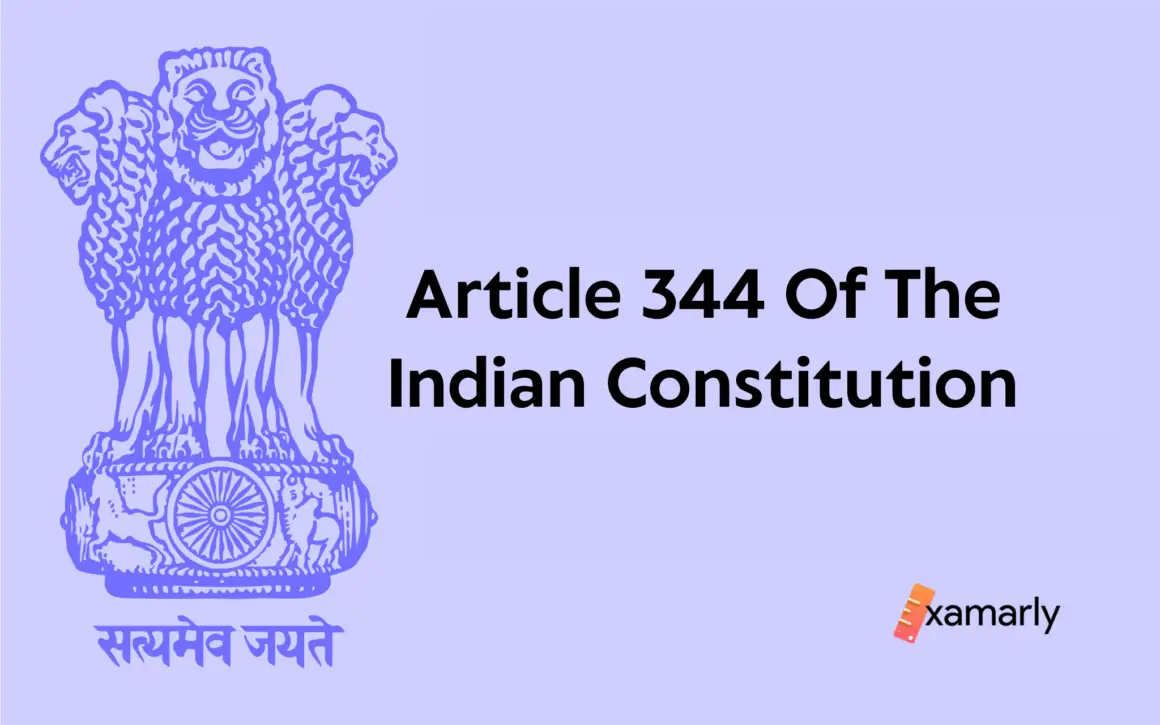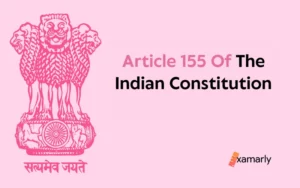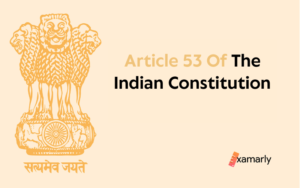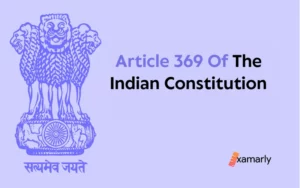Article 344 of the Indian Constitution states that the President establishes a Commission and Committee on Official Language, which are responsible for promoting the use of Hindi as the official language of the Union and for considering matters related to the language’s use.
The Commission, which is constituted by the President every five years, is tasked with making recommendations to the President on the progressive use of Hindi for official purposes and on the use of English and other languages for official purposes.
The Committee, which is composed of members of the national parliament, is responsible for examining the recommendations of the Commission and reporting its opinions to the President. The President may then issue directions based on the report of the Committee.
- Background of Article 344 of the Indian Constitution
- Article 344 of the Indian Constitution – In Detail
- Clause 1 – As it is & Explained
- Clause 2 – As it is & Explained
- Clause 3 – As it is & Explained
- Clause 4 – As it is & Explained
- Clause 5 – As it is & Explained
- Clause 6 – As it is & Explained
- Conclusion
- FAQs Related to Article 344 of the Indian Constitution
- Which part of the Indian Constitution does Article 344 belong to?
- Which schedule of the Indian Constitution talks about Official Languages?
- What is the Commission on Official Language?
- When was the first Official Language Commission constituted?
- How often is the Official Language Commission of Parliament constituted?
- Who appoints the members of the Commission on Official Language?
- What is the duty of the Commission on Official Language?
- What factors should the Commission on Official Language consider when making recommendations?
- What is the Committee on Official Language?
- How is the Committee on Official Language constituted?
- What is the role of the Committee on Official Language?
- What is Single Transferable Vote?
Background of Article 344 of the Indian Constitution
Do you know Draft Article 301B (known as Article 344 of the Indian Constitution today) was not a part of the Draft Constitution 1948? Let’s read about its background to know more.
- Draft Article 301B (later Article 344) was introduced to the Draft Constitution of India in September 1949.
- The article established a mechanism for evaluating the use of Hindi and English as the official languages of the Union.
- The President would appoint a commission with members representing various languages to make recommendations to a committee of legislators, who would then examine the recommendations and submit a report to the President. The President has the power to issue directions based on the report.
- An alternative proposal was made to have a single committee of legislators making recommendations directly to the President, with the President presenting the recommendations and action plan to Parliament.
- This alternative proposal was rejected without substantial debate.
- Draft Article 301B was adopted on September 14, 1949.
Article 344 of the Indian Constitution – In Detail
Clause 1 – As it is & Explained
(1) The President shall, at the expiration of five years from the commencement of this Constitution and thereafter at the expiration of ten years from such commencement, by order constitute a Commission which shall consist of a Chairman and such other members representing the different languages specified in the Eighth Schedule as the President may appoint, and the order shall define the procedure to be followed by the Commission.
The first clause of Article 344 of the Constitution of India talks about the establishment of a Commission on Official Language, which is responsible for evaluating the use of Hindi as the official language of the Union and for making recommendations on its use.
According to the provisions of this article, the President is required to constitute a Commission every five years from the commencement of the Constitution and every ten years thereafter.
The Commission shall consist of a Chairman and other members representing the different languages listed in the Eighth Schedule of the Constitution.
The President has the discretion to appoint the members of the Commission and to define the procedure to be followed by the Commission.
Languages Mentioned in the Eighth Schedule of the Indian Constitution:
- Assamese
- Bengali
- Bodo
- Dogri
- Gujarati
- Hindi
- Kannada
- Kashmiri
- Konkani
- Malayalam
- Manipuri
- Marathi
- Maithili
- Nepali
- Odia
- Punjabi
- Sanskrit
- Santhali
- Sindhi
- Tamil
- Telugu
- Urdu
Clause 2 – As it is & Explained
(2) It shall be the duty of the Commission to make recommendations to the President as to— (a) the progressive use of the Hindi language for the official purposes of the Union;
(b) restrictions on the use of the English language for all or any of the official purposes of the Union;
(c) the language to be used for all or any of the purposes mentioned in article 348;
(d) the form of numerals to be used for any one or more specified purposes of the Union;
(e) any other matter referred to the Commission by the President as regards the official language of the Union and the language for communication between the Union and a State or between one State and another and their use.
As we learned in the first clause of Article 344 of the Constitution of India, the President establishes a Commission on Official Language, which is responsible for making recommendations to the President on various matters related to the official language of the Union. Specifically, the Commission is required to make recommendations to the President on:
(a) the progressive use of Hindi for official purposes: The Commission is required to recommend ways in which the use of Hindi as the official language of the Union can be progressively expanded.
(b) restrictions on the use of English for official purposes: The Commission may recommend restrictions on the use of English for certain official purposes if it determines that such restrictions are necessary.
(c) the language to be used for certain purposes specified in Article 348: Article 348 of the Constitution of India provides that the President may, by order, specify the language or languages to be used for certain purposes of the Union. The Commission may make recommendations on the language or languages to be used for these purposes.
(d) the form of numerals to be used for certain specified purposes: The Commission may recommend the form of numerals to be used for certain specified purposes of the Union.
(e) any other matter referred to the Commission by the President: The Commission may be asked by the President to consider and make recommendations on any other matter relating to the official language of the Union or the language for communication between the Union and a state or between states.
Clause 3 – As it is & Explained
(3) In making their recommendations under clause (2), the Commission shall have due regard to the industrial, cultural and scientific advancement of India, and the just claims and the interests of persons belonging to the non-Hindi speaking areas in regard to the public services.
Clause 3 of Article 344 of the Indian Constitution talks about the factors to be considered by the Commission in making any recommendations. Specifically, the Commission is required to consider the industrial, cultural, and scientific advancement of India, as well as the demands and concerns made by persons who belong to areas where Hindi is not widely spoken.
The purpose of this provision is to ensure that the Commission’s recommendations take into account the diverse needs and interests of all segments of the Indian population.
By considering the industrial, cultural, and scientific advancement of India, the Commission is able to ensure that its recommendations support the overall development and progress of the country.
Similarly, by considering the issues brought up by people from non-Hindi-speaking areas, the Commission is able to ensure that its recommendations take into account the needs and interests of people living in these areas, particularly with regard to public services.
Clause 4 – As it is & Explained
(4) There shall be constituted a Committee consisting of thirty members, of whom twenty shall be members of the House of the People and ten shall be members of the Council of States to be elected respectively by the members of the House of the People and the members of the Council of States in accordance with the system of proportional representation by means of the single transferable vote.
Article 344 of the Constitution of India, in its fourth clause, mentions the formation of a Committee on Official Language, which is responsible for examining the recommendations of the Commission on Official Language and for reporting its opinions to the President.
The Committee is composed of 30 members, 20 of whom are members of the House of the People (also known as the Lok Sabha, or the lower house of the Indian parliament) and 10 of whom are members of the Council of States (also known as the Rajya Sabha, or the upper house of the Indian parliament).
The members of the Committee are elected by the members of the House of the People and the Council of States, respectively, using the system of proportional representation by means of the single transferable vote.
What do you mean by Single Transferable Vote?
This system is a voting method used to ensure that the composition of the Committee reflects the proportional distribution of seats held by different political parties in the national parliament. It allows voters to rank candidates in order of preference, with the votes being transferred to other candidates if the voter’s first choice is eliminated or has already received enough votes to be elected. This ensures that the final composition of the Committee accurately reflects the preferences of the voters.
Clause 5 – As it is & Explained
(5) It shall be the duty of the Committee to examine the recommendations of the Commission constituted under clause (1) and to report to the President their opinion thereon.
This clause describes the responsibilities of the Committee that is mentioned in the fourth clause of Article 344 of the Indian Constitution.
The committee has a duty, or an obligation, to review the recommendations made by a commission. The committee is required to provide their opinion on the recommendations made by the commission to the President.
This means that the committee is expected to carefully consider the recommendations and then provide their own thoughts and judgment on them, which they will present to the President.
Clause 6 – As it is & Explained
(6) Notwithstanding anything in article 343, the President may, after consideration of the report referred to in clause (5), issue directions in accordance with the whole or any part of that report.
The sixth clause of Article 344 of the Indian Constitution provides an exception to a provision described in Article 343.
The clause states that the President may issue directions based on the report provided by the committee, as described in clause (5). The President has the option to follow the whole report or only part of it. This means that the President may choose to adopt all of the recommendations made by the committee or only some of them.
The President is required to consider the report before issuing any directions. This means that the President must give careful thought to the recommendations made by the committee and decide whether or not to act on them.
Conclusion
In conclusion, Article 344 of the Indian Constitution outlines the process for determining the official languages of the Union and the language for communication between the Union and the States.
Every ten years, a Commission is established to consider the use of the Hindi language for official purposes and any restrictions on the use of the English language. The Commission also considers the language to be used for certain specified purposes and the form of numerals to be used.
In making their recommendations, the Commission must take into account the industrial, cultural, and scientific advancement of India, as well as the rights and interests of non-Hindi-speaking areas in regard to public services.
A Committee consisting of members of the national legislature is then tasked with examining the recommendations of the Commission and providing their opinion to the President. The President may then issue directions based on the report, either in its entirety or in part.
You Might Also Like To Read – Article 343 Of The Indian Constitution
FAQs Related to Article 344 of the Indian Constitution
Which part of the Indian Constitution does Article 344 belong to?
Article 344 of the Indian Constitution belongs to Part XVII which is called Official Language.
Which schedule of the Indian Constitution talks about Official Languages?
The Eighth Schedule of the Indian Constitution mentions the Official Languages of India.
What is the Commission on Official Language?
The Commission on Official Language is a body established by the President of India to consider the use of the Hindi language for official purposes and any restrictions on the use of the English language, as well as other matters related to official languages and language use.
When was the first Official Language Commission constituted?
The First Official Language Commission, as required under Article 344 of the Constitution, was constituted by the President in 1955, with B.G. Kher as the Chairman of the Commission.
How often is the Official Language Commission of Parliament constituted?
The Commission is constituted every five years from the commencement of this Constitution, and then every ten years thereafter.
Who appoints the members of the Commission on Official Language?
The President appoints the members of the Commission on Official Language.
What is the duty of the Commission on Official Language?
The Commission has the duty to make recommendations to the President regarding the progressive use of the Hindi language for official purposes, restrictions on the use of the English language, the language to be used for certain purposes, the form of numerals to be used, and any other matters referred to the Commission by the President concerning official languages and language use.
What factors should the Commission on Official Language consider when making recommendations?
The Commission on Official Language must have due regard for the industrial, cultural, and scientific advancement of India when making recommendations.
What is the Committee on Official Language?
The Committee on Official Language is a body consisting of members of the national legislature that are tasked with examining the recommendations of the Commission on Official Language and providing their opinion to the President.
How is the Committee on Official Language constituted?
The Committee on Official Language consists of 30 members, 20 of whom are members of the House of the People and 10 of whom are members of the Council of States. These members are elected by the members of the respective legislative bodies using the system of proportional representation by means of the single transferable vote.
What is the role of the Committee on Official Language?
The Committee on Official Language has the role of reviewing the recommendations made by the Commission on Official Language and providing their own thoughts and judgment on them to the President. The President may then consider the report from the Committee and issue directions based on it, either in its entirety or in part.
What is Single Transferable Vote?
The single transferable vote (STV) is a voting system that is used to elect a group of representatives from a list of candidates. It is designed to ensure that the elected representatives reflect the proportions of the votes cast for each candidate as closely as possible. In an STV election, voters rank the candidates in order of preference. They can rank as many or as few candidates as they wish. When the votes are counted, any candidate who has received a certain minimum number of votes, known as the “quota,” is declared elected. Any votes received by an elected candidate in excess of the quota are then transferred to the voter’s next preferred candidate. This process continues until all of the seats have been filled.






